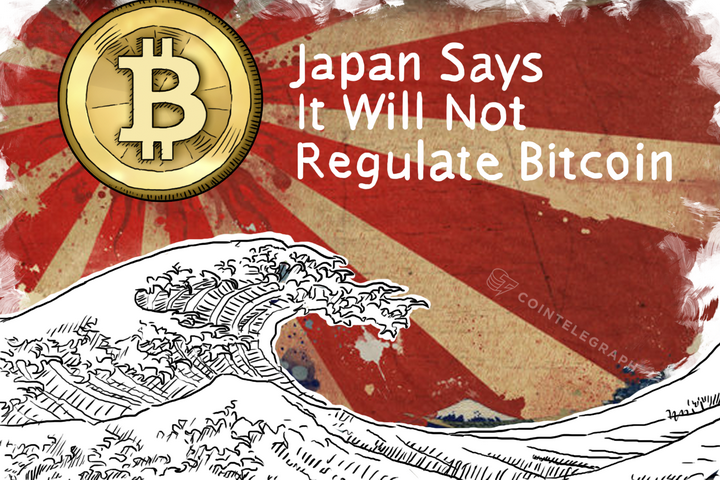The Liberal Democratic Party of Japan has announced that it does not plan to regulate Bitcoin, at least for the foreseeable future.
The collapse of the Tokyo-based Mt. Gox Bitcoin exchange, which resulted in customers losing hundreds of millions of dollars, has put pressure on the Japanese government to implement measures and keep a close eye on cryptocurrencies to prevent a similar scenario from reoccurring.
Speaking at a committee meeting on Thursday discussing the party's take on the crypto-currency, Takuya Hirai, an LDP member who is in charge of the party's internet media division, stated:
"Basically, we concluded that we will, for now, avoid a move towards legal regulation.”
She also added that the final decision would be made after studying the matter further and hearing more opinions from experts on the feasibility of cryptocurrency regulation.
At the time, Mt. Gox was the largest Bitcoin exchange in the world. The now-defunct exchange filed for bankruptcy in February blaming hackers for stealing their customers’ bitcoins, which totaled approximately 850,000 or about 7% of the world's total, worth more than $US 470 million at the time.
Back in April, the head of Japan’s Central Bank, Haruhiko Kuroda, stated that in order for Bitcoin to have a future as a currency, it must prove that it can be a stable and reliable medium of exchange in the aftermath of price volatility and various scandals. Now with the latest decision from Japan’s leading party, it appears that the virtual currency has proven both stable and reliable enough to be openly discussed by lawmakers.
Indeed, as Bitcoin makes its way into the mainstream, governments around the world will show more and more interest on how to approach cryptocurrencies. In the United States, for example, several regulatory agencies on both state and federal levels have been looking into possible regulation. Meanwhile, a special task force of US state regulators is also working on the first Bitcoin rulebook that we can expect to see in about a year from now.
However, Bitcoin’s increasing popularity will undoubtedly make it harder and harder for governments to ignore, and we can expect to see more government examination and rulings on cryptocurrencies in the near future.
Expert commentary
Juan Llanos: "It's surprising and rather encouraging to see a country take a hands-off stance even when the most prominent bitcoin exchange has failed on its own soil. Regulation should be risk-based, that is, all about proportion, and Japan has been enlightened enough to realize that. This single occurrence, although hurtful to some, is proportionately less harmful, both in size and impact, than other financial services, at least for the time being. The effect of this could be very beneficial for this emerging technology and for the country, as it will spur innovation. In the meantime, however, let's not forget that one aspect of bitcoin is already regulated or, at a minimum, covered by international regulatory standards -the cross-border value transmission aspect. In this sense, it's quite possible that bitcoin's ability to transfer value internationally is already covered by Japanese laws and regulations."
Thomas J. Ackermann: "A healthy approach. Generally, due to the nature of Bitcoin as NOT being part of any governments' or banks' business, they should not try to regulate Bitcoin for the limited area they could (i.e. their constituency). Attempts to regulate are as ill-fated as attempts to regulate the Internet - both have no agnostics for national borders. Of course the temptation is always there and will increase as Bitcoin gains more and more popularity - hopefully other governments will choose to adopt the same stance as the LDP in Japan."
Expert commentary
Juan Llanos: "It's surprising and rather encouraging to see a country take a hands-off stance even when the most prominent bitcoin exchange has failed on its own soil. Regulation should be risk-based, that is, all about proportion, and Japan has been enlightened enough to realize that. This single occurrence, although hurtful to some, is proportionately less harmful, both in size and impact, than other financial services, at least for the time being. The effect of this could be very beneficial for this emerging technology and for the country, as it will spur innovation. In the meantime, however, let's not forget that one aspect of bitcoin is already regulated or, at a minimum, covered by international regulatory standards -the cross-border value transmission aspect. In this sense, it's quite possible that bitcoin's ability to transfer value internationally is already covered by Japanese laws and regulations."
Thomas J. Ackermann: "A healthy approach. Generally, due to the nature of Bitcoin as NOT being part of any governments' or banks' business, they should not try to regulate Bitcoin for the limited area they could (i.e. their constituency). Attempts to regulate are as ill-fated as attempts to regulate the Internet - both have no agnostics for national borders. Of course the temptation is always there and will increase as Bitcoin gains more and more popularity - hopefully other governments will choose to adopt the same stance as the LDP in Japan."


